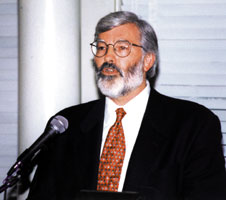|
New
President’s Series

President
Judson Shaver: Marymount Manhattan College
By
Marylena Mantas
He
makes swift, yet natural transitions between phrases associated
with distinctly different disciplines. One moment he speaks of
‘opportunity cost’, then he shifts to ‘evangelical’ and a few
minutes later the reporter finds him preaching about the power
of human potential. The economist, the educator and the minister
surface gradually and the unique terminology leave the reporter
wondering about this man, Judson Shaver, who was charged earlier
this year to lead Marymount Manhattan College, a small liberal
arts college with a student body of about 2,400.
“I
wanted to see what it would be like to be responsible for an entire
institution,” says Shaver, who came to Marymount from Iona College,
where he served as Provost and Academic Vice President. “What
is really attractive to me is a college that has significantly,
unrealized potential…Marymount is a place where heritage and tradition
reflect a sense that humans have incredible potential.”
The seventh president of Marymount, he brings to the college years
of professional experience and a unique personal and academic
background. Born to parents who were missionaries, Shaver spent
much of childhood relocating around the country and the world.
He started college immediately after high school, but dropped
out after two disappointing years to work for a real estate investment
firm. There he encountered his first mentor, who as he says, “believed
in me and convinced me that I could do everything that I wanted.”
He soon realized that investment real estate did not fulfill him
and reconnected with his father, who passed away when Shaver was
young. The connective link came in the form of an old book—the
New Testament written in Greek. Shaver became determined to read
the small book with the navy blue hard cover and his parents’
names penciled within. Enrolling in a local college, he found
a Greek course and proved to the professor that he would not give
up until he read the text.
He soon was able to read not only Greek, but also Hebrew, Aramaic
and a number of other languages associated with ancient manuscripts.
The interest in religion and academia, overpowered the original
economic inclination and led Shaver to the University of Notre
Dame where he earned a Ph.D. in Christianity and Judaism in Antiquity.
The process, he says, taught him that the average person could
achieve anything if they set their mind to it.
He spent the early part of his professional life teaching and
admits he never consciously aspired to become an administrator,
or the president of a university.
“My
main, original debate was whether I would become a minister or
an academic,” he says. He chose academia, which later paved the
way to becoming a dean and to several other administrative positions.
Yet, he speaks of the academic life with a nostalgic tone and
admits that he misses teaching.
“The
responsibilities a teacher has to his/her students are so critical.
That is where the transaction happens…the planned interaction
that will lead to the realization of human potential,” he said.
He hopes to foster those types of interactions between students
and faculty at Marymount and to achieve his mission: “to transform
human potential into human reality.”
He describes Marymount as a “small school in a big city” with
a diverse and dedicated student body that “is very, very neat
and lacks what is common elsewhere, an overwhelming sense of entitlement.”
He cites the extent of interaction between students and faculty
as the characteristic distinguishing Marymount. “Our faculty and
students know each other by name,” he says. “That is what we want
to do and we do it well.”
According to Shaver, the college is currently going through a
self-evaluation process, through which they hope to gain a concrete
understanding of where Marymount stands as an institution and
where they hope to take it. “I don’t think that any one school
should cover everything, but whatever we do we should do it well,”
he said.
He expressed concern over the growing number of students today
who view higher education “as a commodity” and “do not join a
learning community for the sake of their personal growth.”
“People
underestimate the non-financial ways that higher education can
and will enrich their lives,” he says.
Future plans include an improvement of the appearance of the facility,
a significant change in the retention and graduation rates and
the improvement of the ratio of full time to part time faculty.
In addition Shaver wants “faculty and students to hold themselves
to higher academic standards” because, as he says, “students report
not being adequately challenged.”
“We
are working hard toward a shared understanding of what we will
create here,” he said. “Despite our many successes, we are committed
to improving the quality of everything we do.”#
Education Update, Inc., P.O. Box 20005, New York, NY 10001. Tel:
(212) 481-5519. Fax: (212) 481-3919. Email: ednews1@aol.com.
All material is copyrighted and may not be printed without express consent of
the publisher. © 2001.
|

